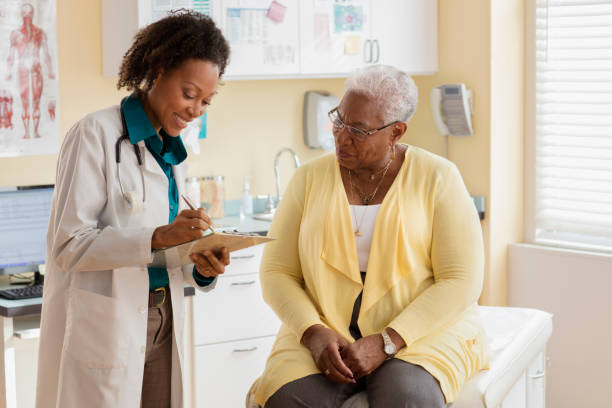
This content was developed in partnership with the Parkinson’s Foundation.
Parkinson’s disease (PD) is often thought of as a disease that only impacts movement, but Parkinson’s affects many systems in the body. Parkinson’s disease symptoms are different from person to person and usually develop slowly over time.
Research findings are varied as to whether Black and African Americans with PD experience a different rate of progression or symptom trends compared to other racial and ethnic groups. More participation by communities of color in research studies will help us better understand how PD — and treatments — specifically impact Black communities and people with PD.
Many people simply dismiss Parkinson’s symptoms as part of aging. Parkinson’s disease symptoms are incredibly varied and impact movement and non-movement functions, such as changes in thinking and sleep.
RELATED: Day 1: Just Diagnosed with Parkinson’s Disease
Movement Symptoms of Parkinson’s Disease
Dopamine is a chemical in the brain that controls movement, as well as our pleasure and emotional responses. With Parkinson’s, the cells in the brain that make dopamine start to die, and this causes increasing problems with movement.
Movement (often referred to as motor) symptoms include:
- Slow movement (called bradykinesia)
- Tremor
- Rigidity and stiffness
- Trouble with balance and falls
- Cramping
- Involuntary movement (called dyskinesia)
- Freezing: the temporary, involuntary inability to move
- Shuffling gait
RELATED: PD 101: What is Parkinson’s Disease?

Non-Movement Symptoms of Parkinson’s Disease
People with PD also experience non-movement (also referred to as non-motor) symptoms. Though non-movement symptoms may not be outwardly visible, they are common and significantly impact well-being.
Combined, depression and anxiety are the number one factors impacting the overall mental health and well-being of people with PD. Some non-movement symptoms can appear years before someone receives a PD diagnosis, like loss of smell, constipation, and disrupted sleep.
Non-movement symptoms include:
- Cognitive changes or changes in the ability to think or remember
- Constipation
- Fatigue
- Lightheadedness
- Loss of sense of smell
- Anxiety and/or depression
- Pain
- Sleep disorders
If you have not been diagnosed with PD, experiencing one symptom does not mean that you should worry. If you notice several symptoms, consider talking to your doctor.
Early Signs and Symptoms of Parkinson’s Disease
#1 Tremor
Have you noticed a slight shaking or tremor in your finger, thumb, hand or chin? A tremor while at rest is a common early sign of Parkinson’s disease.
What is normal? Shaking can be normal after lots of exercise, if you are stressed or if you have been injured. Shaking could also be caused by a medicine you take.
#2 Small Handwriting
Has your handwriting gotten much smaller than it was in the past? You may notice the way you write words on a page has changed, such as letter sizes are smaller and the words are crowded together. A change in handwriting may be a sign of Parkinson’s disease called micrographia.
What is normal? Sometimes writing can change as you get older, if you have stiff hands or fingers or poor vision.
#3 Loss of Smell
Have you noticed you no longer smell certain foods very well? If you seem to have more trouble smelling foods like bananas, dill pickles or licorice, you should ask your doctor about Parkinson’s.
What is normal? Your sense of smell can be changed by a cold, flu or a stuffy nose, but it should come back when you are better.
#4 Trouble Sleeping
Do you thrash around in bed or act out dreams when you are deeply asleep? Sometimes, your spouse will notice or will want to move to another bed. Sudden movements during sleep may be a sign of Parkinson’s disease.
What is normal? It is normal for everyone to have a night when they ‘toss and turn’ instead of sleeping. Similarly, quick jerks of the body when initiating sleep or when in lighter sleep are common and often normal.
#5 Trouble Moving or Walking
Do you feel stiff in your body, arms or legs? Have others noticed that your arms don’t swing like they used to when you walk? Sometimes stiffness goes away as you move. If it does not, it can be a sign of Parkinson’s disease. An early sign might be stiffness or pain in your shoulder or hips. People sometimes say their feet seem “stuck to the floor.”
What is normal? If you have injured your arm or shoulder, you may not be able to use it as well until it is healed, or another illness like arthritis might cause the same symptoms.
#6 Constipation
Do you have trouble moving your bowels without straining every day? Straining to move your bowels can be an early sign of Parkinson’s disease and you should talk to your doctor.
What is normal? If you do not have enough water or fiber in your diet, it can cause problems in the bathroom. Also, some medicines, especially those used for pain, will cause constipation. If there is no other reason such as diet or medicine that would cause you to have trouble moving your bowels, you should speak with your doctor.
#7 A Soft or Low Voice
Have other people told you that your voice is very soft or that you sound breathy and/or hoarse? If there has been a change in your voice you should see your doctor about whether it could be Parkinson’s disease. Sometimes you might think other people are losing their hearing, when really you are speaking more softly.
What is normal? A chest cold or other virus can cause your voice to sound different, but you should go back to sounding the same when you get over your cough or cold.
#8 Masked Face
Have you been told that you have a serious, depressed or angry look on your face, even when you are not in a bad mood? This is often called facial masking. If so, you should ask your doctor about Parkinson’s disease.
What is normal? Some medicines can cause you to have the same type of serious or staring look, but you would go back to the way you were after you stopped the medication.
#9 Dizziness or Fainting
Do you notice that you often feel dizzy when you stand up out of a chair? Feeling dizzy or fainting can be a sign of low blood pressure and can be linked to Parkinson’s disease.
What is normal? Everyone has had a time when they stood up and felt dizzy, but if it happens on a regular basis you should see your doctor.
#10 Stooping or Hunching Over
Are you not standing up as straight as you used to? If you or your family or friends notice that you seem to be stooping, leaning or slouching when you stand, it could be a sign of Parkinson’s disease.
What is normal? If you have pain from an injury or if you are sick, it might cause you to stand crookedly. Also, a problem with your bones can make you hunch over.
Learn More About PD Symptoms on the Parkinson’s Foundation website:
- 10 Early Signs describes the symptoms that can appear early in Parkinson’s disease.
- Movement Symptoms and Non-Movement Symptoms provides in-depth information on all symptoms.
- Non-Motor Symptoms: What’s New? focuses on how to identify, treat and live optimally with non-movement symptoms.
- Recognizing Non-Motor Symptoms in PD Daniel Van Wamelen, MD, PhD, discusses non-movement symptoms and ways to address them.
This content was developed in partnership with the Parkinson’s Foundation. To learn more about Parkinson’s disease and find resources to help you live better with Parkinson’s, visit Parkinson.org or call the Parkinson’s Foundation Helpline at 1-800-4PD-INFO (1-800-473-4636).

References
- Parkinson’s Foundation, Parkinson.org
- Kessler, I.I. (1972). Epidemiologic studies of Parkinson’s disease: II. A hospital-based survey. American Journal of Epidemiology, 95(4), 308–318.
- Mayeux, R., Marder, K., Cote, L. J., Denaro, J., Hemenegildo, N., Mejia, H., Tang, M. X., Lantingua, R., Wilder, D. Gurland, B., & Hauser, A. (1995). The frequency of idiopathic Parkinson’s disease by age, ethnic group, and sex in northern Manhattan, 1988-1993. American Journal of Epidemiology, 142(8), 820–827.
- Xie, T., Laio, C., Lee, D., Yu, H., Padmanaban, M., Kang, W., Johnson, J., Alshaikh, J., Yuen, C., Burns, M., & Chiu, B.C.-H. (2021). Disparities in diagnosis, treatment, and survival between Black and White Parkinson patients. Parkinsonism and Related Disorders, 87, 7-12.






